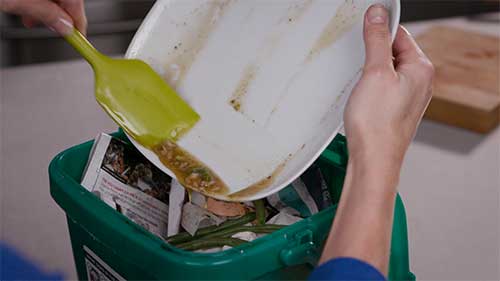
Putting fats, oils and grease down the sink can cause a real pain in the drain. To dispose of these food properly, make sure to “wipe it, green bin it” and put them in your green bin, not down your sink.
As they travel through pipes and sewers, fats, oils, and grease harden and pick up other materials along the way. The result: clogged pipes in your home and blocked sewers that can overflow into homes, businesses and the environment.
Metro Vancouver and its member jurisdictions spend at least $3 million every year to repair damage caused by fats, oils and grease in the sewer system. And that's not counting the costs to individual homeowners to fix clogged pipes. Save your pipes (and your sewers): put grease in your green bin, not down the drain.
Putting grease in your green bin allows it to be turned into compost (instead of ending up in the landfill), which reuses resources and reduces greenhouse gasses. So remember: wipe it, green bin it.
What can't go down the drain
Most of us know bacon grease doesn’t go down the drain, but did you know that there are lots of other foods that can clog pipes?
How to dispose of fats, oils and grease (wipe it, green bin it)

- Scrape small amounts left over on plates, pots and pans into your green bin before washing.
- Larger amounts of grease and oil, like deep fryer oil, can be dropped off at a
recycling depot that accepts grease and oil.
Need to dispose of a lot of used cooking oil and can’t get to a depot? Try putting small amounts in your green bin every day until you have disposed of the entire amount. Only put in what can be absorbed by the contents of your green bin (fuller green bins can absorb more liquids than emptier ones). Excess liquids in the green bin can cause problems further down the line, as the trucks that collect green bins are not designed to handle liquids.
Fact checker: common grease myths
Find out if these common myths about fats, oils and grease are fact or fiction.
How fats, oils and grease affect the sewer system
Check out these videos to see firsthand what happens when fats, oils and grease get into the region’s sewer system.